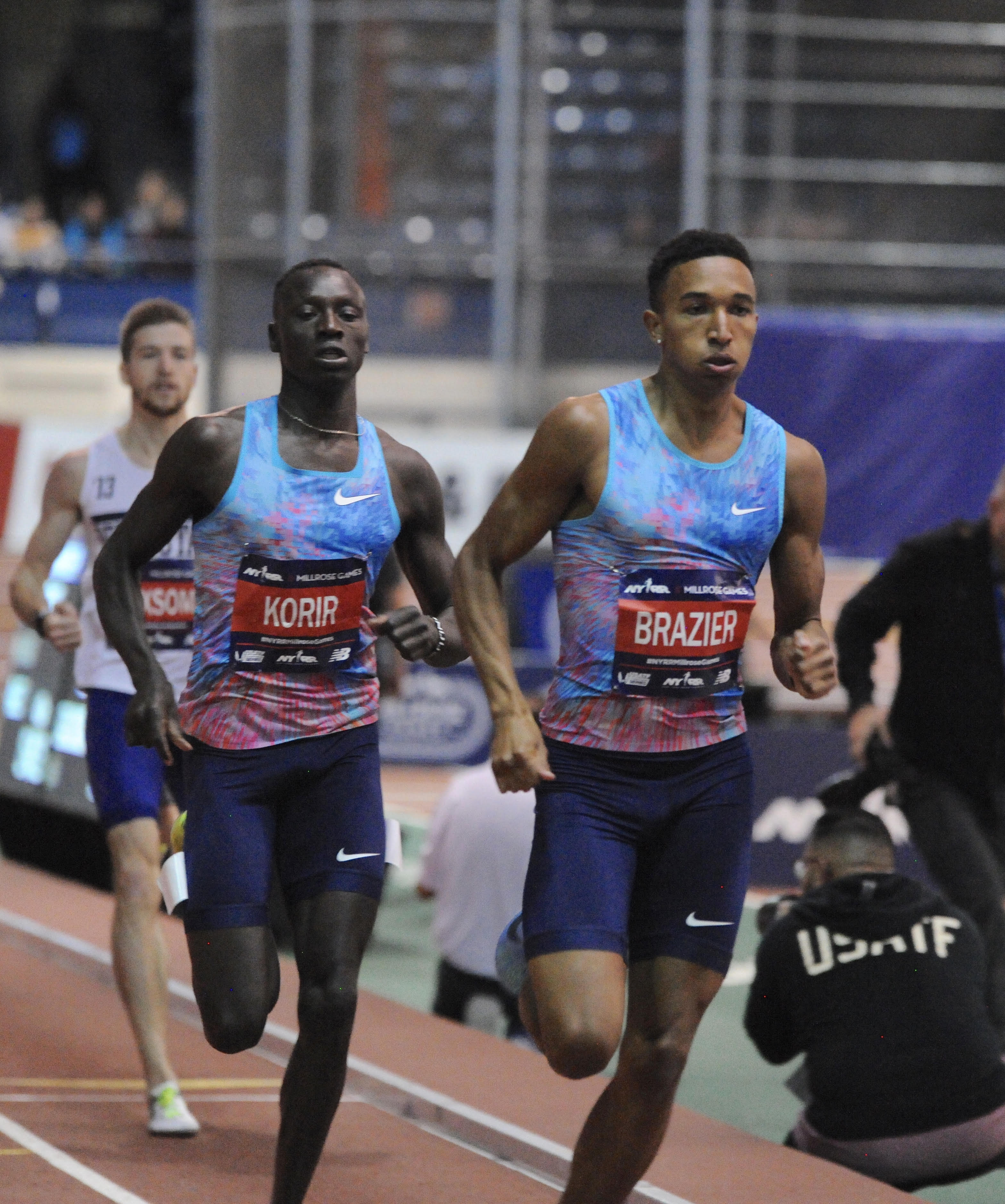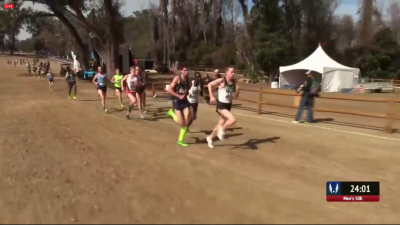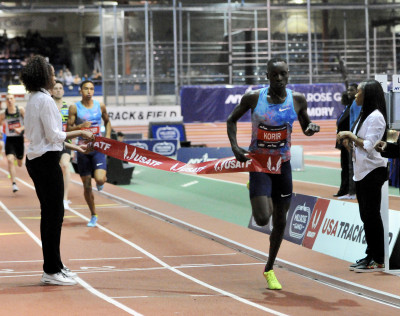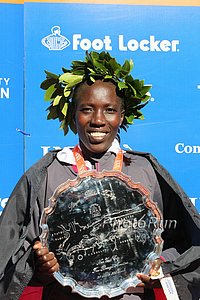WTW: Some Stars Thankfully Ran US Cross, Emmanuel Korir Was Flying, Edna Kiplagat Struggled, Russian Doping and Coaching Advice from Katelyn Tuohy’s Coach
The Week That Was In Running, January 29 – February 4, 2018
By LetsRun.com
February 7, 2018
Past editions of the Week That Was can be found here. Questions, comments, or a tip? Please call us at 844-LETSRUN (538-7786), email us or post on our forum.
If you missed our in-depth coverage of USA XC, Camel City or Millrose, catch up now:
NYRR Millrose: LRC Two World Records Fall + Emmanuel Korir Runs The Fastest Indoor 800 In 17 Years At 2018 Millrose Games
Camel City: LRC Edward Cheserek Runs 3:53 On A Flat Track, Paul Chelimo Wins $10,000 And Rachel Schneider Wins Even More ($12,000)
USA XC: LRC Emily Infeld and Leonard Korir Prevail In Thrilling Duels To Win 2018 USATF Cross Country Championships
****
Quote of the Week / She’s Back
“I’m home for good in the USA now! I’m a lecturer in Kinesiology at Penn State University. It’s been amazing to rediscover the joy of racing here in Happy Valley.”
-Michelle Sikes, 32, the 2007 NCAA 5000 champion, talking to Race Results Weekly after running 9:18.53 for 3000 at Penn State in what appears to be her first serious race since 2009.
We imagine many people under the age of 25 have no idea who Sikes is. She ran collegiately at Wake Forest. A year after running 16:09 and finishing 3rd at ACCs in the 5000 and 5th at NCAAs, she had a dream senior campaign in 2007.
Before her senior year was over, she had run 15:09.28, set an NCAA meet record of 15:16.76 to win the 5000 title (#2 time in NCAA history at the time) over someone by the name of Sally Kipyego, ran at the World Championships in the 5000 after finishing 3rd at USAs and, oh yeah, had been named a Rhodes Scholar. Even though Kipyego lost the 2007 NCAA 5000 to Sikes, Kipyego, who of course went on to win an Olympic silver in 2012, Kipyego called that 5000 race her favorite college race because she was pushed the hardest. She said in 2008, “It still remains my favorite race of the entire time I’ve been competing at NCAAs.”
Sikes’ return to the sport in her early 30s is in stark contrast to what many top US men have been doing in their early 30s. In recent years, a slew of high-profile Americans have retired in their early 30s — whether it’s Andrew Wheating at 30, Alan Webb and Chris Solinsky at 31, Ryan Hall at 33, or Matt Tegenkamp at 34.
****
Stat of the Week I – The Depth Was Lacking At USA XC, But the Quality Was Not
We GREATLY enjoyed the 2018 USA XC Champs as some big stars showed up and raced. As we wrote in our race recap, “one of the fundamental truths about our sport is that races only matter if the athletes decide they matter.”
We had no idea what to expect as many of the big names such as Evan Jager and Galen Rupp hadn’t raced cross country in years. Jager hadn’t raced since 2006 and Rupp hadn’t raced XC since 2011.
It’s a good thing a couple of big stars showed up as the races were greatly lacking in depth. Check out these stats.
0 – number of men that finished within 2 minutes of the masters men’s winner, Kevin Castille (8k race)
4 – number of girls that finished within 2 minutes of the junior girls’ winner, Ashley Tutt of Northern Illinois (6k race)
7 – number of women that finished within 2 minutes of the masters women’s winner, Jennifer Bayliss (6k race)
7 – number of women that finished within 2 minutes of women’s winner, Emily Infeld (10k race)
11 – number of boys that finished within 2 minutes of the junior boys’ winner, Connor Lane of Stanford (8k race)
27 – number of men that finished within 2 minutes of men’s winner, Leonard Korir (10k race)
USATF needs to think about combining the US XC champs and the club champs as the number of entries this year wasn’t good at all. Yes, we know it wasn’t a World XC year, but that’s going to be the case every other year now.
More: 2018 USATF XC Coverage
****
Stat of the Week II
$27,000 – amount of prize money offered at the 2018 USATF Cross Country Championships
$27,800 – amount of prize money offered at the All-American City 10k road race in Edinburg, TX, (population 87,000) last week.
The All-American City 10k offered $2,000 for top American honors and with so many top US stars at either USA XC, Millrose or Camel City, there was some low-hanging fruit. Kyle Masterson finished as the top American male in 30:41 while Angel Ramirez won $1,000 for running 33:30. Yes, 33:30 in a men’s 10k paid out $1,000.
In the women’s race, American Hillary Montgomery won $2k for running 34:16 while Brianna Schrader won $1000 for running 36:36. The overall winners ($4,700) were Julius Koskei (28:37) and Iveen Chepkemoi (32:26) of Kenya.
****
Stat of the Week III / Emmanuel Korir Was Flying at the End of His 1:44

26.37 – final 200 split for Emmanuel Korir when he ran 1:44.21 at the NYRR Millrose Games last Saturday, the fastest indoor time recorded in the world in a generation (since 2001).
26.61 – final 200 split for David Rudisha when he ran his 1:40.91 WR.
Some of you may think it’s not right to put Rudisha and Korir in back to back lines, but we disagree. The history of sports is about witnessing transcendent athletes whom fans can’t ever imagine being surpassed and yet time after time we learn records are made to be broken. When Roger Federer first ruled the tennis world, making 10 straight Grand Slam finals between 2005 Wimbledon and the 2007 U.S. Open (winning eight of them), it seemed as if he was playing almost perfect tennis. How could anyone possibly top that? Then just a few years later Novak Djokovic and Rafael Nadal were consistently beating Federer. Despite Federer’s recent resurgence, it should be noted that he has a losing career record against both Djokovic (22-23) and Nadal (15-23).
Enough tennis talk. If anyone is going to break Rudisha’s supreme 1:40.91, it’s probably going to be someone like Korir who has super 400 speed (44.53) for an 800 guy. We sure hope you appreciated his run like we did.
Watching Emmanuel Korir run the fastest indoor time in 17 years at Millrose was a thing of beauty. What a magnificent athlete. He was flying at the end. One thing we’ve realized in analyzing his splits is Korir picked it up the last 200. Almost always in a super fast 800, the last 200 is the slowest in the race. But not last Saturday for Korir. The fact that he picked it up at the end means to us that he can go even faster. Remember, this was his 2018 opener.
Now if Korir is going to approach Rudisha’s outdoor times (he’s already surpassed Rudisha’s indoor times as Rudisha unbelievably has never raced a single time indoors), he’s going to have to learn to push more on the third 200. Rudisha’s third 200 in London was an incredible 25.02.
David Rudisha‘s splits at London 2012: 23.7^, 25.6^, 25.02, 26.61
Emmanuel Korir‘s splits at Millrose 2018: 24.28, 26.24, 26.83, 26.37
^estimated time.
*****
Most of the Sochi 2014 Russian Doping Bans Are Overturned
So Russia has supposedly been officially banned from the 2018 Winter Olympics, which begin this week in PyeongChang, South Korea. Did you know the following?
- The deputy director of the suspended Russian Olympic Committee took part in the Olympic torch relay in Korea?
- The Russians included Sergei Chudinov as a coach on their team to Korea even though he was banned* from the Olympics as an athlete in November 2017?
- 169 Russian athletes will be competing in the 2018 Winter Olympics.
We learned all of these things and more from an EXCELLENT column by Neil Wilson on sportsfeatures.com. Wilson was distraught last week when the Court of Arbitration for Sport overturned WADA’s ban of 28 Russian Winter Olympians from 2014 for doping and reinstated their 2014 Olympic results, writing “the war on doping ended eight days before the Winter Olympic Games opens in abject surrender.”
While we loved Wilson’s column and while we are known as being leaders of the anti-doping movement, we actually are going to disagree a little with Wilson’s conclusion here. Bear with us please; we know you likely have doping fatigue but it’s important to understand what CAS did here. While their full decision hasn’t been posted online, they posted a summary and it’s pretty simple. CAS basically said that they didn’t really care whether or not Russia had systematic doping going on at the 2014 Sochi Games (they didn’t rule on that one way or the other). They wanted to see enough proof to convict each athlete individually and ruled:
“Both CAS panels unanimously found that the evidence put forward by the IOC in relation to this matter did not have the same weight in each individual case. In 28 cases, the evidence collected was found to be insufficient to establish that an anti-doping rule violation (ADRV) was committed by the athletes concerned.”
We get it. Courts don’t want to convict individuals without big-time evidence. And of course, that is logical. But these individual athlete cases need to be analyzed in conjunction with the strong evidence of systematic Russian doping. For example, if all of the samples they provided were tampered with, we’d obviously nullify the results even if we didn’t have proof that an individual sample was dirty.
Think of it this way: if the authorities found cases upon cases of steroids in the Philadelphia Eagles locker room on Sunday night, it wouldn’t be right to ban every player as it’s possible that a few of them had resisted the temptation to do what virtually everyone else was doing. However, it certainly would be correct and right to ban the Eagles as a team for at least a season for a failure of “institutional control.” Individual players would probably have to be freed from their contracts and allowed to compete for other teams.
As a result, the IOC got it all wrong. They went for the individual bans instead of the team ban. The Russian team should have been banned from Korea. IOC defenders, we don’t want to hear you arguing that’s what they did. The argument of “they banned the federation but couldn’t stop individual athletes from competing as ‘Olympic Athletes from Russia'” isn’t one we are buying in this case. Do you realize the Russian hockey teams are still competing in Korea as “Olympic Athletes from Russia”? TOTALLY RIDICULOUS. The team in the Olympics is your country. Russia should have been made to skip one Olympics. Period. Let the individual luge athletes, skiers, etc. compete on the individual circuit but not the Olympics. If that’s not legally possible, then at least ban the team sports like hockey, curling, etc.
Two more things.
1) We hope that CAS eventually rules on whether or not they think there was systematic doping as the Russians are now using the recent case to act like they are the victim of some grand conspiracy.
2) If you want to read an absolute dreadful column on the matter then read the following column by Alan Abrahamson: IT’S NOT A THING TO BE GUILTY JUST BECAUSE YOU’RE RUSSIAN.
Abrahamson starts the piece by making the same point we’ve made above — everyone should have the right to an individual trial. We 100% agree with the following statement, “Guilt by association is wrong. Judged by the company you keep — no. It’s not a thing to be guilty just because you’re Russian.” Ok, fair enough, but then he somehow goes from that idea to concluding that Russian doping scandal of 2014 is no different than what has happened in recent years in other countries, writing, “People from all over cheat. The Russians are not per se better or worse than the Americans or the Brits or the Germans.”
That’s just crazy. Yes, the US certainly has had its share of high-profile convicted dopers from Justin Gatlin to Alex Rodriguez to Lance Armstrong, but we’ve never had FBI agents breaking into doping labs to manipulate samples or a shadow set of drug testers. Perhaps Abrahamson would say the state aspect of Russian doping hasn’t been proven — that’s why we made point #1 as the evidence is very compelling in our mind. Go stream Icarus on Netflix. However, we wouldn’t be talking about the piece now if it wasn’t for the conclusion which really raised our ire.
Reports have suggested that [Dr.] Rodchenkov testified before CAS with his face hidden.
What, this is a mafia trial?
Rodchenkov fled Russia and, for reasons entirely uncertain, is said to be in the witness protection program in the United States. He and Walden, his lawyer, have suggested that he is in ever-present grave personal danger.
The disconnect is that, as Rodchenkov said in an interview with the German outlets ARD and Deutschlandfunk made public this week, “I worry about my family which I left in Russia. I am worried about my children, my wife, about my dog — by the way.”
You don’t have to be the world’s best lawyer to find a lot in that answer with which to cross-examine Rodchenkov.
What kind of man leaves his family behind? You say you’re at risk of being murdered? What about them?
And — the dog?
By the way?
If Abrahamson crazy? Does he not realize that Nikita Kamaev, the former head of the Russian anti-doping agency who was planning on writing a book, and Vyacheslav Sinev, the chairman of the executive board of the Russian Anti-Doping Agency, both suddenly died in the span of 11 days in 2016 while in their 50s? Yes, their deaths have not proven to be murders, but it’s been well-established that when one crosses they highest echelons of the Russian state, they do so at great risk. Anyone remember the polonium murder of Alexander Litvinenko in 2006?
The fact of the matter is Dr. Rodchenkov’s life is most definitely at risk whether he’s lying or telling the truth, whether he’s a great family man or terrible family man, or dog lover or abuser. To mock him is a low blow.
*Chudinov’s ban was one of those overturned last week.
More: NEIL WILSON: The war on doping suffers a winter shock
*NEIL WILSON: Olympic bans must stick – for the sake of sport
*Alan Abrahamson: IT’S NOT A THING TO BE GUILTY JUST BECAUSE YOU’RE RUSSIAN.
*Alan Abrahamson: IF YOU’RE WORKED UP ABOUT THE RUSSIANS, WHAT ABOUT A-ROD? We’ve got to give Alan some credit. As much as we hated the column above, we really liked this one. One thing is certain: he at least makes you think when you read his stuff.
****
Defending Boston Marathon Champ Edna Kiplagat Struggles in Japan
At a windy and snowy Marugame Half Marathon in Japan last week, the winners were Kenyans Edward Waweru (60:31) and Betsy Saina (69:17). However, considering one of the biggest stories of 2018 from an American perspective is going to be the women’s race at the Boston Marathon with Shalane Flanagan, Molly Huddle, Jordan Hasay, and Desi Linden, the biggest news might have been the fact that reigning Boston champ Edna Kiplagat was awful, running just 73:56.
If Kiplagat isn’t in shape, it certainly would increase the odds of an American win in Boston. Of the eight women in the 2018 Boston field who have broken 2:23:00 in the last decade, only four of them aren’t American and one of those four is the 38-year-old Kiplagat.
We wouldn’t rule Kiplagat out just yet, however. She issued a statement to David Monti through her agent Brendan Reilly:
“I had a cold last week and I thought before I traveled to Japan I had fully recovered. But my body was feeling heavy during the days in Japan before the race and I was sleeping a lot. Even with easy running before the race, I was not feeling sharp. I think during the race I had not fully recovered, because my body was not responding as well is it should. With the wind and the snow, it also made it a tough day. I’ll rest well after we fly back to Eldoret, and then we will resume the training for Boston.”
And if you think 38 means she’s too old to win, realize she just turned 38 in November. Meb Keflezighi won Boston in 2014 and ran his pb just one month before turning 39.
More: In Windy Conditions, Kenyans Edward Waweru (60:31) And Betsy Saina (69:17) Win Titles As Japan’s Yuta Shitara Runs 61:14 And Sara Hall 71:25 WR holder Zersenay Tadese ran his first half in nearly two years but only managed a 61:42. Edna Kiplagat was only 12th in 73:56.
*MB: Edward Waweru Runs 60:31 As Japan’s Yuta Shitara Runs 61:14 At Marugame Half (Tadese Runs 61:42 In His 1st Half In 2 Years)
****
We don’t think these three pregnancies are a coincidence
Congrats to Melissa Bishop, Shannon Rowbury, and Faith Kipyegon — all three women announced last week that they are pregnant and will be missing the 2018 season.
Balancing a career with motherhood isn’t easy for any mom, but it’s particularly difficult for professional distance runners as there are only a very limited number of years that one can be a world-class runner. With no global outdoor championship in 2018, it’s a good year to miss.
MB: Melissa Bishop, the Beyoncé of Canadian Track and Field, is PREGNANT!
MB: Shannon Rowbury is pregnant
****
Free Coaching Advice From Katelyn Tuohy’s Coach – Remember You Shouldn’t Try To Accomplish All Of Your Goals This Year
We loved reading the profile last week on NXN champ Katelyn Tuohy by Nancy Haggerty on lohud.com. The article started with a great anecdote. It says that Tuohy was offered a place on the start line on the NYRR Millrose Games as both and 8th and 9th grader but coach Brian Diglio turned it down as he wanted her to have things to look forward to in future years. As Haggery wrote, “After all, if you reach for the stars and snare them all early, what’s left? Where’s the challenge? What’s the next goal?”
Tuohy did run this year — as a 10th grader — and tied up after getting a big early lead in her pursuit of a sub-4:40 and ended up running 4:47.10 for fourth.
The idea of “leaving things to accomplish” also should apply to training. If you are doing everything — weights, drills, plyos, mileage — in year #1, then what is there to add in future years?
More: Nationally known Katelyn Tuohy heads for huge stage in running Millrose Games HS mile
*Gabrielle Wilkinson Steals Katelyn Tuohy’s Thunder In The Millrose Games High School Mile Reportedly, Tuohy, only a sophomore, was crushed by the loss and ran “to the bathroom in tears” after the race.
*MB: How Gabrielle Wilkinson won the Millrose HS Girl’s Mile
****
Recommended Reads
- Profile On 2:29 British Marathoner Aly Dixon, Who Has “Unfinished Business” At The 2018 Commonwealth Games
- Donavan Brazier Looking Towards World Indoors After Putting A Disappointing London 2017 Behind Him
- A Decade After Winning The Millrose High School Mile, Kyle Merber Shooting For The Wanamaker Mile Title
- Katelyn Tuohy Doesn’t Think She’s Ready To Run Her Fastest Mile In Millrose, But Wants To Go Under 4:40
To see our favorite reads from other weeks, go here.
****
Quotes Of The Day And Last Week’s Home Pages
To see the actual quotes of the day from last week or last week’s home page or any home page, go to our archive page.



